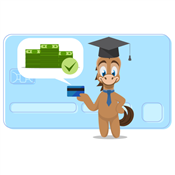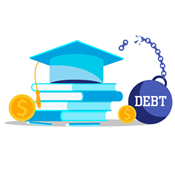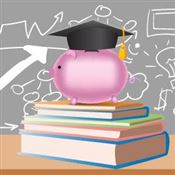Paying Off Student Loans Early
Is it smart to pay off student loans early? It can hurt your credit temporarily but the benefits outweigh the cons. Find out which student loans you should pay off first.
 |
| © CreditDonkey |
- Should You Pay Off Student Loans Early?
- Drawbacks to Paying Off Loans Early
- How Student Loans Affect Your Credit Score
- Should I Pay Off My Loans in One Lump Sum?
- Pay Off Student Loans or Invest
- Tips to Pay Off Student Loans Early
- Repayment Plan Options
- Income-Driven Repayment Plans with Forgiveness
- Loan Forgiveness and Cancellation
- Refinancing Your Loans
Should You Pay Off Student Loans Early?
Getting rid of your student loan debt is a great idea IF you can afford it. But it's important not to stretch your finances too thin.
Before you decide to pay off your student debt, make sure you have these areas covered:
- Emergency fund
Make sure you have 3–6 months of normal expenses saved, preferably in a high interest bank account. If your car needs repairs or you unexpectedly lose your job, you'll want enough money on hand to cover expenses. - Retirement
The sooner you start saving, the better. Remember, the amount you set aside early in your career has decades to grow through smart retirement investing. - Other debt
Your student loans may be hurting your finances less than other types of debt. It all comes down to interest. If you have other debt with a high interest rate, like credit cards, it probably makes sense to pay those off first.
The average student loan interest rate ranges from 4.45%–7%, depending on the type of loan.
The average credit card interest is 17.61%, with many card rates topping 20%.
That means you'll pay nearly 3 times as much in interest for credit card versus student loan debt.
Once you've accounted for these three things, then you can turn your attention to paying off your student loan debt early. However, there are some disadvantages. Keep reading to learn more.
Drawbacks to Paying Off Loans Early
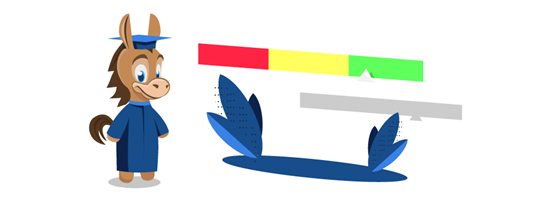 |
| © CreditDonkey |
Credit Score Impact
Making regular payments on your student loans will strengthen your credit over time. This is especially useful for young adults, who haven't had time to establish a strong credit history.
By paying off your loans early, you lose this opportunity to steadily build up your credit. More on that below.
Loss of Tax Deduction
Student loans offer savings through interest tax deductions. If you meet the following requirements, you can write off a maximum of $2,500 paid in student loan interest:
- You are obligated to pay interest on a qualified student loan.
- You paid interest on a qualified student loan.
- Your filing status is not married and filing separately.
- You are not claimed as a dependent on anyone's tax return.
You may also be able to deduct simple interest paid on your student loans as well as loan origination fees, capitalized interest, and interest paid on refinanced student loans if you used your loan balanced to pay for qualified education expenses.
HOW STUDENT LOANS AFFECT Your CREDIT SCORE
Having student loans have a positive effect on your credit. Paying them off early can (slightly) lower your score. Why?
Your credit consists of two kinds of debt:
- Installment loans like student debt and mortgages
- Revolving loans like credit cards
Creditors prefer a mixture of both, which young people just starting out usually don't have. But of the two, installment loans are considered "good credit."
By making timely payments of your student loans, you show creditors that you can be trusted to pay back debts regularly over a long period of time.
Once you pay off these loans, the account will be considered closed. It'll remain on your credit report for several years but the benefit is less than it would be for an open installment account.
However, this shouldn't prevent you from paying off your student loans early. Doing so can save you hundreds or even thousands of dollars in interest. And your credit history is affected by several factors, not just the mix of installment and revolving accounts.
- Payment history (35%): Whether you pay bills on time and/or carry a balance.
- Credit utilization (30%): The amount of credit you're using compared to the total you've been given.
- Length of your credit history (15%): How long you've had credit accounts and activity.
- Types of credit (10%): The kinds of credit you have (credit cards, car loan, student loan, etc.)
- New credit (10%): Number of inquiries and/or new applications for credit.
Should I pay off my student loan in one lump sum?
If you can afford to pay off your student loans all at once without negatively impacting your life, it may be worth considering. Unlike other kinds of loans, most federal and private student debt doesn't have prepayment penalties.
But before you commit a big chunk of your savings, ask yourself these questions:
- Do you have an emergency fund in case the unexpected happens? If not, you may need to charge expenses to a credit card, which will likely have a much higher interest rate.
- Have you begun saving for retirement? If not, a portion of your student loan payoff could give you a good headstart.
- Do you have other, high interest debt that you should pay off first to save money?
- Do you have short-term (within the next 3 years) plans for which that money will be needed? This could include a wedding or new home purchase.
Rather than pay off your students loans in one lump sum, it may be wise to commit yourself to paying them off early through extra payments on a regular or even periodic basis.
You may be able to negotiate a student loan payoff with a private student loan lender. Ask your lender what they would be willing to negotiate, rather than approach them with a set proposal.
Before you commit, see if your loans are eligible for loan forgiveness, discharge, or income-driven repayment options. Read on to learn about these possibilities.
Pay Off Student Loans or Invest
In some ways, choosing to pay off your student loans or investing those funds comes down to a math problem.
- The average annual return from investing (based on the S&P 500 index) is about 10%.
- The average interest rate of student loans is 4.45%–7%.
That means you'd save more money investing than paying off your loans. But that answer involves a big IF.
Investing always carry some level of risk. An average annual return doesn't mean that you're guaranteed to make that amount-or any amount for that matter. On the other hand, paying off your student loans early is certain to save you money over the long term.
Here's a good middle-ground solution: Pay off your student loans early, but put some money aside in a retirement account that can grow over time.
Paying off your student loans shouldn't come at the expense of saving money. At the very least, you put set aside 3–6 months of regular expenses (rent, food, car insurance, etc.) in an emergency fund. You don't want to have to rely on your credit cards–and their very high-interest rates–if disaster strikes.
Be sure to consider your long-term goals, too, whether that means a wedding, new house, or even a long-awaited vacation. Emptying your bank account to pay off your loans early can have real consequences for your future.
Tips For Paying Off Student Loans Early
- Pay extra each month
You could make an extra payment each month. Even slightly increasing what you pay will make a difference.
If you pay an extra $50 every month above the required $261 payment, you reduce the term of your loan by 12 payments.
That saves $717.51 in interest charges over the life of your loan.
- Start with the most expensive loans
Paying down the loans with the highest interest will save you the most money in the long run. Once that first loan is paid off, roll over the payment amount to the next loan with the second-highest interest.
Instead of applying extra amounts to the principal, your lender may credit it towards your next month's payment. This won't do much to reduce your interest or make a dent in the balance.
Specifically, ask your lender to avoid "Paid Ahead" status to ensure that your progress isn't slowed down.
- Use your credit card rewards
Reward points and cash back are good for more than just shopping or travel. For example, the Citi ThankYou Preferred Card allows you to convert reward points into a student loan rebate voucher. - Put windfalls to work
If you receive a tax refund, use it to make an extra payment toward your student loans. - Live with your parents
Sure, it's a sacrifice but you can make serious headway in paying off your student loans. The trick is to use the money you would have spent on rent and bills for your loans. This could be anywhere from $700–$1,500 per month depending on your location.
Determined to pay off your loans early? Start by learning about your payment options.
Repayment Plan Options
With Federal loans, you're automatically assigned to the Standard Repayment Plan, which evenly divides payments over 10 years.
Taking the average student debt of $37,000 and average 5% interest, this means paying $392 per month for 10 years.
If you can't afford that, other plans are available. These include:
- Graduated Repayment Plan
This is still a 10-year plan, but the payments start out low and grow over time. Your payment will increase by 20% every two years.The max payment will never be more than 3x your original payment. This is a great option if you believe your income will increase over the next decade.
- Extended Repayment
Under this plan, your term could be extended up to 25 years. This makes your monthly payments lower. However, you pay a lot more in interest over time.
These plans don't exactly help you cancel loans. But they make loans more manageable so that they can be paid off. Read on for repayment plans that offer forgiveness.
Income-Driven Repayment Plans with Forgiveness
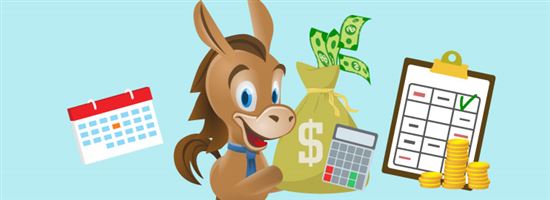 |
| © CreditDonkey |
You can also choose one of the 4 income-driven repayment options. With these plans, your monthly payment is based on your income.
If you earn very little, your payments could even be $0. After 20–25 years of payments, the rest of the balance will be forgiven.
Here are important things to know about the income-driven forgiveness program:
Only Federal loans are eligible
Direct and Direct PLUS Loans are eligible. If you have other loans (such as Federal Stafford Loans or Perkins Loans), you may need to consolidate them into a Direct Consolidated Loan first.
Your payment is based on your discretionary income
You monthly payment can be as little as 10% of your discretionary income. If you earn very little, your monthly payments could even be $0.
For example:
- Income is $40,000 a year (after taxes)
- Family of 1
- Poverty level for family of 1 is $12,060.
- 150% x Poverty Level = $18,090
Discretionary Income = $40,000 - $18,090 = $21,910.
Depending on the plan you choose, after 20–25 years of payments, the rest of the balance will be forgiven.
Here are the available income-driven payment plans:
INCOME-BASED REPAYMENT (IBR)
You must have Federal Direct Loans or Federal Family Education Loans (Stafford, Federal PLUS Loans, or Federal Consolidation Loans) to qualify.
- Loans taken out before July 1, 2014: Students pay 15% of their discretionary income. After 25 years of payments, any amount left over is forgiven.
- Loans taken out after July 1, 2014: Students pay 10% of their discretionary income. After 20 years of payments, any leftover amount is forgiven.
As your income increases, so does your payment. The maximum payment is the amount of the Standard Repayment Plan's payment.
As a bonus, the government will pay your interest on subsidized loans for the first 3 years. After that, the unpaid interest may get added to your principal balance. Luckily, this doesn't happen until your IBR payment equals the Standard Repayment payment.
Under a Standard Repayment Plan, this means you will owe a total of $63,640, including interest. Your annual adjusted income is $30,000.
But you enter the Income-Based Repayment plan with a monthly payment of $148/month. After 25 years of payments on this plan, you will have paid a total of $44,662. The rest is forgiven at that point.
The example above isn't always the case, however. You will pay more interest over the life of the loan - because it is 20–25 years rather than the Standard Repayment Plan's 10 years.
And as your monthly income increases, so does your monthly repayment amount, up to that of the Standard Repayment Plan.
PAY-AS-YOU-EARN REPAYMENT (PAYE)
Fewer graduates will be eligible for this program because of date restrictions.
- You must be a new borrower after October 1, 2007. In other words, you must not have any student loans dating before this date. You must also have taken out an eligible loan after October 1, 2011.
- Payments are 10% of your discretionary income. If you don't have an income right now, you don't have a payment.
- Your outstanding balance is forgiven after 20 years of payments.
This loan's max payment also equals the Standard Repayment plan payment. Interest payback begins when you reach that amount.
REVISED PAY-AS-YOU-EARN REPAYMENT (REPAYE)
The REPAYE program is for people who don't fall into one of the above categories. There are no date restrictions. Parent PLUS loans and most private loans are excluded.
- Payments are 10% of your discretionary income.
- There is no cap on the payments, unlike the other plans we discussed thus far. As your income increases, so do your payments. This could make for some hefty bills if you become successful.
- Your outstanding balance is forgiven after 20 years of payment. Because there is no payment cap, you won't have any interest added to your principal balance.
INCOME-CONTINGENT REPAYMENT (ICR)
This is the ONLY repayment plan available for borrowers with Parent PLUS loans. To be eligible, the Parent PLUS loans must first be consolidated into a Direct Consolidation Loan.
- For the ICR plan, discretionary income = your adjusted gross income - 100% of the poverty level (instead of 150%).
- Your payment is 20% of your discretionary income OR payments based on a 12-year repayment plan, whichever is less. This payment may also exceed the Standard Repayment Plan monthly payment.
- The government does not subsidize any unpaid interest. 100% of the unpaid interest gets added to your loan balance annually. However, no more than 10% of the loan balance will be added.
Keep learning to see if you qualify for student loan forgiveness and cancellation.
This may still be the better option. Your tax liability is often much lower than the amount forgiven.
PUBLIC SERVICE LOAN FORGIVENESS (PSLF)
If you work for a government agency or non-profit, you may be eligible for Public Service Loan Forgiveness.
- You MUST be enrolled in one of the 4 Direct Loan Program repayment plans to qualify.
- You must work full-time and make 120 qualifying payments. Payments made before enrollment don't count as qualifying payments towards PSLF.
- After 10 years of payments in any of the above plans, your loan balance may be forgiven.
If you have Federal Perkins Loans and/or Federal Family Education Loans (FFEL), you must consolidate them into a Direct Consolidated Loan in order to qualify for PSLF. You also need to make 120 payments towards the new consolidated loan.
Loan Forgiveness and Cancellation
 |
| © CreditDonkey |
There are many assistance programs available today that may qualify you for cancellation or loan forgiveness.
Federal Perkins Loan Cancellation and Discharge
Perkins Loans are no longer offered. However, if you took them out before the expiration, you may be eligible for Federal Perkins Loan Cancellation.
Look into this BEFORE you consolidate your Perkins Loans. Once you consolidate, you may no longer be eligible.
This forgiveness program can offer 100% forgiveness in just 5 years. You get a fixed percentage of loans (plus interest) forgiven for each year of service. They are as follows:
- 15% for the 1st year
- 15% for the 2nd year (total 30%)
- 20% for the 3rd year (total 50%)
- 20% for the 4th year (total 70%)
- 30% for the 5th year (total 100%)
Several professions are eligible for this program, including teachers, nurses, firefighters, and law enforcement officers.
LOAN FORGIVENESS FOR TEACHERS
Teachers working at a low-income school for 5 consecutive years may qualify for loan forgiveness if they have:
- State certification
- A license to teach in that state
- Student loans not currently in in default
Elementary school and middle school teachers may receive up to $5,000 in forgiveness.
Teachers who specialize in math, science, or special education may receive up to $17,500 in forgiveness.
LOAN FORGIVENESS FOR NURSES
Nurses have several forgiveness programs available to them.
Nurse Corps Loan Repayment Program
Eligible for nurses, RNs, APRNs, and nurse educators who work in an eligible Critical Shortage Facility OR teach in an eligible public or private nonprofit school of nursing.
After 2 years of service, you can get 60% of loan repayment. After another year, you can get 25% more.
National Health Service Corps Loan Repayment Program
Provides loan repayment for health professionals working in medically underserved areas. This includes nurse practitioners and certified nurse-midwives.
You can get up to $50,000 of repayment for a 2-year service.
Loan Forgiveness for Nurses.
LOAN FORGIVENESS FOR DOCTORS
National Health Service Corps provides up to $50,000 towards your medical school debt for those serving in Health Professional Shortage Areas. Eligible fields include:
- Primary care medical
- Dental
- Behavioral health professional
After a 2-year commitment, you can apply to continue your service in exchange for further loan forgiveness.
LOAN FORGIVENESS FOR MILITARY
Army Repayment Program
Active members can get 33.33% of their loan balance paid for each year of service, up to $65,000 for 3 years.
You must request the Loan Payment Program before enlisting. Also, you must score at least a 50 on the Armed Services Vocational Aptitude Battery. Those in the Reserves can get 15% each year, up to $20,000.
Navy Repayment Program
Navy service members can receive up to $65,000 over the course of 3 years.
To qualify, you must have had the loan prior to enlisting in the Navy. Also, you must include your application for the Repayment Program prior to enlisting.
Air Force Repayment Program
Members of the Air Force Judge Advocate General Corps are eligible.
You can get up to $65,000 over a 3-year period. This is paid directly to your student loan provider.
CHECK YOUR STATE FORGIVENESS PLANS
State-funded student loan forgiveness plans are also available depending on where you live. These programs often require you to work in an underserved area.
Most of the plans offered are for nurses, doctors, lawyers, teachers, and veterinarians. But you can also find programs for other professions.
For example, New York offers repayment for social workers through the NYS Licensed Social Worker Loan Forgiveness Program. This program offers up to $26,000 in loan forgiveness.
A few requirements for the program include:
- You must live in NY for a year
- You must be a licensed social worker
- You must not be in default on your student debt
Texas offers the Loan Repayment Program for Speech-Language Pathologists and Audiologists. This program encourages students to work in speech-language pathology. The requirements and amount offered may differ.
EMPLOYEE ASSISTANCE PROGRAMS
Student Loan Repayment Plans (SLRP's) are gaining popularity as a company benefit offered by employers.
SLRP options:
- Employer pays the student loan off in full.
- Employer pays a portion of the student loan.
Check with your employer to find out if they offer the SLRP benefit and the specific eligibility and benefit parameters they have in place.
OTHER FORGIVENESS OPTIONS
You may be able to get your federal loans discharged due to a catastrophic event. These may include:
School Closing Down
If you attended a school, either in the United States or overseas, that closed, you may be eligible for a federal loan discharge.
For example, ITT, a large career college, closed its doors. Thousands of students were left in the dark about their education and federal loans. They are eligible for a discharge.
Students should contact the Department of Education, which can be reached at 1-800-433-3243.
Passing of a Student
Another type of discharge available is when a student has passed away. The federal loan servicer handling the student's loans will require a certified death certificate for authentication and will then discharge the loans.
Disability
If a student becomes disabled and is no longer able to perform the duties for which they received the federal student aid, they may be eligible for a discharge.
For example, students who went to a career college for Commercial Driver's License training may be eligible for a discharge if they became an insulin-dependent diabetic.
Always look at all the facts to see if you're eligible for a discharge. Do not pay for a loan that you might not owe.
COMMON LOAN FORGIVENESS QUESTIONS
How long does it take to have a student loan forgiven?
This depends on the program you apply for. For an income-driven repayment plan, it can take up to 25 years of payments before your loans are forgiven.
The PSLF program forgives your loans after 10 years. Other programs for teachers, nurses, and doctors can have loans forgiven in a little as 2 years.
Are federal student loans forgiven at age 65?
No. In the U.S., age-based loan forgiveness does not exist. In fact, the federal government can reduce your Social Security retirement benefits if you default on your student loan.
Do they forgive student loans after 20 years?
The federal income-driven repayment plans will forgive any remaining federal student loan debt after 20 years of payments (or 25 years, depending on your plan). You can enroll in one of the forgiveness programs if you have Direct Federal Loans.
Can student loans be removed from my credit report?
Student loans are only removed from credit reports after they are fully paid. Negative remarks (such as a late payment) will stay on your credit report for 7 years before being removed.
If you're in default with federal loans, a one-time rehabilitation option is available that will remove negative remarks and bring your loan current.
How can someone get out of student loan debt without paying?
There are various loan forgiveness programs that will forgive your loans if you work in certain careers, such as a teacher or nurse in a high-need area.
You can defer your loans until forgiveness kicks in, which means interest won't accrue and you don't make payments. Other ways to eliminate student loan debt without paying include:
- Total disability discharge
- School closing down
- Death
Refinancing Your Loan
 |
| © CreditDonkey |
When you took out your student loan(s), you signed an agreement to repay the loan at a set interest rate. It may have been a variable interest rate, which means you're not necessarily stuck with it forever.
You may be able to lower or lock your interest rate by refinancing your loan with a private lender. By refinancing, you take out a new, locked low-interest rate student loan that pays off most or all your existing student loans.
Benefits of Refinancing
Refinancing your student loans can result in thousands of dollars saved on interest. When you find the right lender, you can obtain a lower interest rate.
This means a higher percentage of your payments goes toward your principal balance, which also means you pay less interest over the life of the loan.
HOW TO FIND THE BEST LOAN REFINANCE OPTION
Student loan refinance options vary, so you'll want to shop around with private lenders and find the best offers. The best student loan refinances often have several benefits you should look out for.
Lower Interest Rates
The point is to save money. So you'll want to find an interest rate that is lower than what you pay now.
Note: Interest rates vary because they are based on individual credit and income. Check the rates from several lenders and keep the search within a 14-day window. This way it only counts as one credit inquiry on your credit report.
A soft credit pull will not affect your credit score and does not show up on your credit report.
A hard credit pull will drop your credit score by at least a couple of points, and it will remain on your credit report for 2 years.
Fixed Interest Rates
If you can pay your loan off early, a variable rate might be your best option. Variable rates are often lower than fixed rates.
This can save you money over the life of your loan. Know that your monthly payment amount might go up if your interest rate increases, so if you aren't sure how long you'll need to pay off your debt, stick with a fixed rate.
Also, make your loan payments on time. Loan payments apply to interest first, then principal. By paying your loan late, your principal balance does not lower or pay off as quickly.
No Origination Fees
You don't have to pay origination fees for a private student loan.
But be careful: Your lender may include early repayment penalties in the contract. Steer clear of loans that charge for this. You do not want to pay more for a loan that you are trying to pay off early.
Automatic Payment Reduced Rates
You could qualify for a reduced interest rate, up to a .25% discount, by agreeing to have your payments automatically deducted from your checking account.
This reduction may not seem significant, but it will add up over the life of your loan. Ask your lender if this option is available.
Have questions about refinancing? We've got the answers below.
Common Refinancing Questions
What's the Difference Between Refinancing and Consolidating?
Refinancing student loans gives you the option to find a better rate and term. Consolidating your federal student loans means lumping multiple loans into one. You pay a weighted average of all interest rates on your loans.
Consolidating doesn't usually save you money. It simply reorganizes your student debts. You can refinance both federal and private loans, but you can only consolidate federal student loans (as they are part of a federal program).
Keep in mind that with consolidation, you may enter an income-driven repayment plan, which could have up to a 25-year repayment period. If you decide to refinance, you will lose out on any federal loan benefits that you may have accrued, such as federal loan forgiveness.
What Credit Score Do You Need to Get Approved?
It goes without saying: the higher your score, the better. Each lender has their own requirements. Basically, they don't want late payments, collections, or any type of default on your credit report.
The lenders we chose don't focus solely on your credit score, though it is certainly a factor. They look at your employment history, savings patterns, and potential for the future too.
How Do You Prove You Can Afford the Refinance?
The lender will ask you for appropriate documents. Be prepared to show your last few pay stubs and tax returns.
Lenders will look for consistent income and employment over the last year or so. They don't base your approval solely on your income. But it does play a big role.
How Do You Qualify to Refinance?
If you decide to refinance your student loans, there are some steps that you must take to qualify.
- Be prepared to answer questions such as: What loans do you have, what are the interest rates, and are you able to afford a monthly payment?
- Visit one or more of the websites suggested here and fill in your information.
- You'll receive offers for loan refinancing. Make sure you read and understand the rates and terms of your offer(s).
- Finally, accept the terms of your chosen loan refinance offer. You'll be on your way to lower student loan interest rates.
BOTTOM LINE
Before paying down student loans, weed out all possibilities of loan forgiveness, discharge, or refinance. Then pay what you can afford. Do not sacrifice your basic living expenses or emergency savings.
To find extra money for student loan repayment, look for target areas where you can budget your money and bring in extra income. The sooner you get out of debt, the quicker you will be able to invest in yourself.
Write to Mary Humphrey at feedback@creditdonkey.com. Follow us on Twitter and Facebook for our latest posts.
Note: This website is made possible through financial relationships with some of the products and services mentioned on this site. We may receive compensation if you shop through links in our content. You do not have to use our links, but you help support CreditDonkey if you do.
